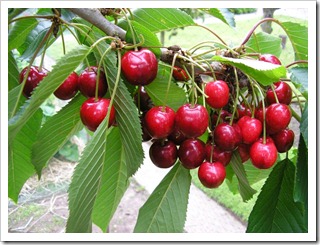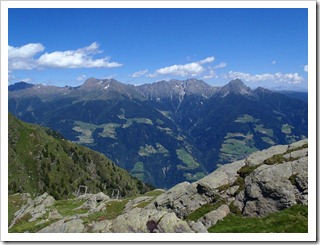It’s a perennial source of confusion, we’ve examined it in depth in a couple of posts, it’s the theoretically simple but deceptively elusive word molto, molta, molti, molte. Here’s a quiz that should help to clarify any difficulties you may be having. But before you have a go at it I suggest that you revisit these blogs: Using Molto And Tanto and How To Use Molto
Fill in the gaps in the following sentences with molto, molta, molti or molte:

1. Quest’anno ci sono ….. amarene sull’albero = This year there are a lot of sour cherries on the tree
2. A Geoff e a me piace ….. passeggiare in montagna = Geoff and I like walking in the mountains a lot
3. Quando siamo andati a San Marino abbiamo visto ….. turisti da tutte le parti del mondo = When we went to San Marino we saw a lot of tourists from all over the world
4. Non faccio altro che bere perché ho ….. sete = I keep drinking because I’m really thirsty (Literally: … because I have a lot of thirst. N.B: sete = thirst, is feminine singular, la sete)
5. Oggi ho cucinato ….., così domani sono libera di andare al mare = today I’ve cooked a lot, so tomorrow I’ll be free to go to the sea
6. Geoff ha speso ….. tempo a tagliare l’erba questo pomeriggio = Geoff spent a lot of time cutting the grass this afternoon
7. La settimana scorsa è stata ….. calda = last week was very hot

8. Siamo ridiscesi giù a valle ….. velocemente = we descended back down into the valley really quickly
9. A Ravenna abbiamo visto ..… bellissimi mosaici bizantini = In Ravenna we saw many beautiful Byzantine mosaics
10. L’aereo è atterrato ..… in ritardo = The plane landed very late
To finish with, here’s a sentence in which molto appears twice, once as an adjective (meaning that the ending agrees with the noun) and once as an adverb (meaning that it stays as molto). Which is which? L’inverno passato non è stato ….. freddo, ma abbiamo avuto ..… pioggia = Last winter wasn’t very cold, but we had a lot of rain.
Next Monday we’ll give you the correct answers, explaining the grammatical function of molto in each sentence. In the mean time, stay tuned for poco!
Buon lavoro e fate molta attenzione!


Comments:
Elizabeth Hardcastle:
Ciao Serena and Geoff
Your language blog is really, really helpful. I wonder if you could do a blog about the use of the imperfect and perfect of essere and stare. I was recently talking in Italian about my family and I used the imperfect of essere to describe happenings etc. For example I repeatedly used c’era or c’erano or used era or erano for describing people, events and objects. Should I have used the perfect of stare eg ‘il mio padre era/e stato/stava un figlio unico’. ‘Era una casa grande’?
Thank you – and thanks again for your blog.
Robin:
1. Quest’anno ci sono MOLTE….. amarene sull’albero = This year there are a lot of sour cherries on the tree
2. A Geoff e a me piace MOLTO….. passeggiare in montagna = Geoff and I like walking in the mountains a lot
3. Quando siamo andati a San Marino abbiamo visto MOLTI….. turisti da tutte le parti del mondo = When we went to San Marino we saw a lot of tourists from all over the world
4. Non faccio altro che bere perché ho MOLTA?….. sete = I keep drinking because I’m really thirsty (Literally: … because I have a lot of thirst. N.B: sete = thirst, is feminine singular, la sete)
5. Oggi ho cucinato MOLTO….., così domani sono libera di andare al mare = today I’ve cooked a lot, so tomorrow I’ll be free to go to the sea
6. Geoff ha speso MOLTO ….. tempo a tagliare l’erba questo pomeriggio = Geoff spent a lot of time cutting the grass this afternoon
7. La settimana scorsa è stata MOLTO….. calda = last week was very hot
8. Siamo ridiscesi giù a valle MOLTO….. velocemente = we descended back down into the valley really quickly
9. A Ravenna abbiamo visto MOLTI..… bellissimi mosaici bizantini = In Ravenna we saw many beautiful Byzantine mosaics
10. L’aereo è atterrato MOLTO..… in ritardo = The plane landed very late
L’inverno passato non è stato MOLTO….. freddo, ma abbiamo avuto MOLTA..… pioggia = Last winter wasn’t very cold, but we had a lot of rain.
Serena:
@Robin Molti complimenti Robin! Tutte giuste!
June:
Cari amici, il problema per gli student americani e` che non sanno la differenza fra un aggettivo e un avverbio. Cosa facciamo?? Mammamia. E` facile…molto/avverbio = very (non cambia); molto, molta, molti, molte/aggettivo = much, many (cambia) Con speranza… June
Geoff:
@June Non solo gli Americani! Mi sa che fra un po’bisogna fare un blog sull’argomento.
Grazie June 🙂